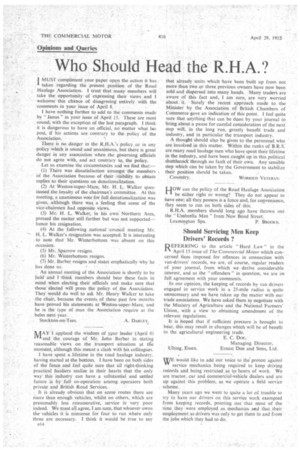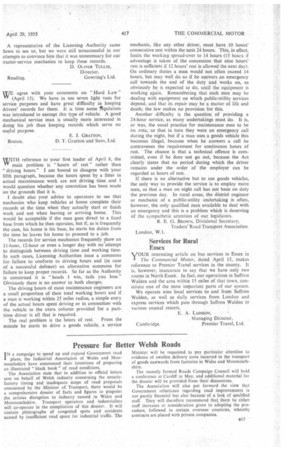Opinions and Queries
Page 48

Page 49

If you've noticed an error in this article please click here to report it so we can fix it.
Who Should Head the R.H.A.?
JMUST compliment your paper upon the action it has taken regarding the present position of the Road Haulage Association. I trust that many members will take the opportunity of expressing their views and I welcome this chance of disagreeing entirely with the comments in your issue of April 8.
I have nothing further to add to the comments made by " Janus " in your issue of April 15. These are most sound, with the exception of the last paragraph. I think it is dangerous to have an official, no matter what his post, if his actions are contrary to the policy of the Association.
There is no danger in the R.H.A.'s policy or in any -policy which is sound and unanimous, but there is great -danger in any association when the governing officials do not agree with, and act contrary to, the policy.
Let us examine the circumstances and we find that:— (1) There was dissatisfaction amongst the members of the Association because of their inability to obtain replies to their questions on denationalization.
(2) At Weston-super-Mare, Mr. H. L. Walker questioned the loyalty of the chairman's committee. At this meeting, a unanimous vote for full denationalization was given, although there wast a feeling that some of the vice-chairmen had opposite views.
(3) Mr. H. L. Walker, in his own Northern Area, pressed the matter still further but was not supported— hence his resignation.
(4) At the following national council meeting Mr. H. L. Walker's resignation was accepted. It is interesting to note that Mr. Winterbottom was absent on this occasion.
(5) Mr. Sparrow resigns.
(6) Mr. Winterbottom resigns.
(7) Mr. Barber resigns and states emphatically why he has done so.
An annual meeting of the Association is shortly to be held and I think members should bear these facts in mind when electing their officials and make sure that those elected will press the policy of the Association. They would do well to ask Mr. Henry Walker to take the chair, because the events of these past few months have proved his statements at Weston-super-Mare, and he is the type of man the Association require at the helm next year.
Stockton-on-Tees.
A. DARLEY.
J\4AY 1 applaud the wisdom of ypur leader (April 8) and the courage of Mr. John Barber in stating reasonable views on the transport situation at die moment, although this meant a clash with his colleagues.
I have spent a lifetime in the road haulage industry, having started at the bottom. I have been on both sides of the fence and feel quite sure that all right-thinking practical hauliers realize in their hearts that the only way' this industry can have a substantial and settled future is by full co-operation among operators both private and British Road Services.
_ It is already obvious that on some routes there are more than enough vehicles, whilst on others, which are presumably less remunerative, service is very poor indeed. We must all agree. I am sure, that whoever owns the' vehicles it is nonsense for four to run where only three are necessary. I think it would be true to say that already units which have been built up from not more than two or three previous owners have now been sold and dispersed into many hands. Many traders are aware of this fact and, I am sure, are very worried about it. Surely the recent approach made to the Minister by the Association of British Chambers of Commerce gave an indication of this point. I feel quite sure that anything that can be done by your journal to bring about a pause for careful consideration of the next step will, in the long run, greatly benefit trade and industry, and in particular the transport industry.
A thought should also be given to the personnel. who are involved in this matter. Within the ranks of B.R.S. are many road haulage men who have spent their lifetime in the industry, and have been caught up in this political shuttlecock through no fault of their own. Any sensible step which can be taken by the Government to stabilize their position should be taken.
Coventry. WORRIED VETERAN.
1_10W can the policy of the Road Haulage Association I I be either right or wrong? They do not appear to have one; all they possess is a fence and, for convenience, they Seem to run on both sides of this, R.H.A. members should long ago have thrown out the "Umbrella Men from New Bond Street.
Leamington Spa. P. BROOKS.
Should Servicing Men Keep Drivers' Records ?
REFERRING to the article " Hard Law" in the April 15 issue of The Commercial Motor which concerned fines imposed for offences in connection with van-drivers' records, we are, of course, regular readers of your journal, from which we derive considerable interest, and as the " offenders " in question, we are irs, full agreement with your comments.
In our opinion, the keeping of records by van drivers engaged in service work in a 25-mile radius is quite unnecessary and we have taken up the matter with our trade association. We have asked them to negotiate with the Ministry of Agriculture and the National Farmers' Union, with a view to obtaining amendment of the relevant regulations.
It is hoped that if sufficient pressure is brought to bear, this may result in changes which will be of benefit to the agricultural engineering trade.
E. C. DOE,
Managing Director, Ernest Doe and Sons, Ltd. lilting, Essex.
E would like to add our voice to the protest against service mechanics being required to keep driving records and being restricted as to, hours of work. We are tractor, car and commercial-vehicle dealers and are up against this problem, as we operate a field service scheme.
Many years ago we went to quite a lot of trouble to try to have our drivers on this service work exempted from keeping records, pointing out that most of the time they were employed as mechanics and that their employment as drivers was only to get them to and from the jobs which they had to do. A representative of the Licensing Authority came down to see us, but we were still unsuccessful in our Ittempts to convince him that it was unnecessary for our tractor-service mechanics to keep these records.
D. OLIVER TULLIS, Director,
Reading. Gowring's Ltd.
WE agree with your comments on "Hard Law"
(April 15). We have in use seven light vans for service purposes and have great difficulty in keeping drivers' records for them. It is time some It gulation was introduced to exempt this type of vehicle. A good mechanical service man is usually more interested in doing his job than keeping records which serve no useful purpose.
E. J. GRATTON,
Boston, D. T. Gratton and Sons, Ltd.
WITH reference to your first leader of April 8, the " main problem is "hours of rest" rather than "driving hours." I am bound to disagree with your fifth paragraph, because the hours spent by a fitter in actual maintenance work are not driving time and I would question whether any conviction has been made on the grounds that it is. • I doubt also your advice to operators to see that mechanics who keep vehicles at home complete their records at the time when they actually start or finish work and not when leaving or arriving home. This would be acceptable if the man goes direct to a fixed base from which he then operates, but if, as is frequently the case, his home is his base, he starts his duties from the time he leaves his home to proceed to a job.
The records for service mechanics frequently show an 11-hour, 12-hour or even a longer day with no attempt to distinguish between driving time and working time. In such cases, Licensing Authorities issue a summons for failure to conform to driving hours and (in case of a successful defence) an alternative summons for failure to keep proper records. So far as the Authority is concerned it is "heads I win, tails you lose." Obviously there is no answer to both charges.
The driving hours of most maintenance engineers are a small proportion of their total working hours and if a man is working within 25 miles radius, a simple entry of the actual hours spent driving or in connection with the vehicle in the extra column provided for a parttime driver is all that is required.
The real problem is the hours of rest. From the minute he starts to drive a goods vehicle, a service mechanic, like any other driver, must have 10 hours' consecutive rest within the next 24 hours. This, in effect, limits the working spread-over to 14 hours (15 hours if advantage is taken of the concession that nine hours' rest is sufficient if 12 hours' rest is allowed the next day). On ordinary duties a man would not often exceed 14 hours, but may well do so if he answers an emergency call •towards the end of the duty and works on, as obviously he is expected to do, until the equipment is working again. Remembering that such men may be dealing with equipment on which public-utility services depend, and that its repair may be a matter of life and death; the law makes no provision for this.
Another difficulty is the question of providing a 24-hour service, as many undertakings must do. It is, or was, the usual practice for maintenance men to be on rota, so that in turn they were on emergency call during the night, but if a man uses a goods vehicle this becomes illegal, because when he answers a call he contravenes the requirement for continuous hours of rest. The chance is that a technical offence is committed, even if he does not go out, because the Act clearly states that no period during which the driver remains under the order of the employer can be regarded as hours of rest.
If there is no alternative but to use goods vehicles, the only way to provide the service is to employ more men, so that a man on night call has not been on duty the previous day. In rural areas, the district engineer or mechanic of a public-utility undertaking is often, however, the only qualified man available to deal with an emergency and this is a problem which is deserving of the sympathetic attention of our legislators.
R. E. G. BROWN, Divisional Secretary,
Traders' 'Road Transport Association. London, W.I.
Services for Rural Essex
voua interesting article on bus services in Essex in I The Commercial Motor, dated April 15, makes reference to Premier Travel services in the county. It is, however, inaccurate to say that we have only two routes in North Essex. In fact, our operations in Saffron Walden and the area within 15 miles of that town, constitute one of the most important parts of our system. We operate nine local services to and from Saffron Walden, as well as daily services from London and express services which pass through Saffron Walden to various coastal resorts.
E. A. LAINSON,
Managing Director, Cambridge. Premier Travel, Ltd.




































































































